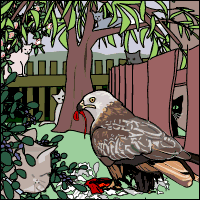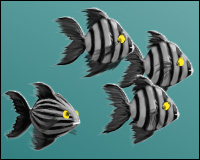The Colours of the World
Created | Updated Jan 23, 2011
Elektra and I have a new cheap hobby: birdwatching.
No, we don't wander the woods with binoculars and keep a diary. ('I saw one more yellow-bellied sapsucker than you did, nyah, nyah...')
Instead, we let the birds come to us, lazy things that we are. The bounty out our back window can lead to connection, not only of human with nature, but of mind with thought.
In the last week, for me at least, watching the birds has led to thoughts of...
The Colours of the World

Winter is grey, and then it's white. Even in North Carolina. It all started when the snow came, and we got worried about the birds.
Before the 'Great Fire of Durham', we lived upstairs, facing the car park. We didn't have anywhere to put a bird feeder, since our balconies are enclosed by wire mesh – so-called 'screen porches'. So we contented ourselves with watching the birds who shared the trees with the raucous squirrels who taunted the little black cat at intervals (see my earlier musings on the subject). Nowadays, we live on the ground floor, facing a wooded valley. This is colder in winter, but much more picturesque, and offers us the opportunity to feed and watch birds. For the investment of about 14 US dollars a month, we can strew birdseed on the ground outside – cracked corn and sunflower seeds for those awful crows (of course they found out where we were, they're better than the police) and squirrels – and have the satisfaction of knowing that our friends aren't going hungry. We also get to look at them.
Boozardina, the hyperactive black cat, is enjoying this. Not only has she continued her abominable habit of winkling out leaves caught in the cracks of the screen porch – although, to my great delight, the screening here is reinforced, and she can't make holes in it – but she gets to sit and bird-watch with us. The birds are safe, although every so often, Boozardina stretches an exploratory claw underneath the bottom of the screen, and a squirrel shoots across the tiny lawn and races up a tree trunk. The ensuing cussing is a further lesson in rodent vocabulary. Clancy, less aggressive, hunkers down agreeably and observes with interest.
What surprised me was the variety to be found in a wooded area surrounding a nature trail and a row of electricity pylons. Besides the usual sparrows, tits, chickadees, juncos and such, we see mockingbirds, catbirds, and two pairs of cardinals, whose bright red flash is startling across a fresh snowscape. Today we saw a lone bluejay and a red-headed woodpecker, also called a 'peckerwood' in these parts. A colourful display. They hang around for awhile, too, pecking at seeds. Sometimes the bigger birds bully the small ones away for a few minutes. But they always come back. There's enough food for all.
I grew up thinking that just about all the birds in the woods around me were brown, black, or grey – except, of course, for the North American Robin, the appearance of whose bright orange shirtfront heralds spring for us. This is because I grew up short-sighted and in suburbs with newly-planted trees that were unattractive to birds. Our resident robin – we always called him 'he' – had to build 'his' nest in the crook of our drainpipe. What a spring that was...we got to watch them learn how to fly...
I was only disabused of the dull-coloured-bird notion my senior year in high school, when I took piano lessons at Mrs Dillinger's house. Mrs Dillinger (imagine a thin, arch version of Hyacinth Bucket, with rather more money than Hyacinth and actual musical talent), in addition to being a snob in all things cultural ('Those biddies at the Tuesday Musical Society didn't appreciate Debussy, but I taught them!'), political ('I DO so love William F Buckley, and between you and me, the South should have won the Civil War!') and feline ('Did you see this kitten my husband had the nerve to bring home?' [Adorable kitten.looks piteously up from kitchen linoleum.] 'He said, "But you had cats." Those were PEDIGREED SIAMESE!'), was also a snob about birds.
Mrs Dillinger lived in a posh house in a well-wooded, established neighbourhood. Her bird feeders were a wonder. At one window, you could see jays, robins, and the like. At another, tiny chickadees and brightly-coloured finches. I'd never known such beauty existed in the Pennsylvania woods. To keep the large, noisy blackbirds happy, Mrs Dillinger hung a bag of suet on the big oak in the back yard. This should not be construed as approving of them, however. They were Low Class Birds.
The squirrels, while treated with equal disdain, were also treated – to peanuts in the shell, from the front porch. I saw a squirrel come up to Mrs Dillinger and take a peanut from her hand. I swear it pulled its forelock in gratitude.
Personally, I find brown and grey birds just as interesting as coloured ones. I am not like Mrs Dillinger – or the New Jersey Aquiarium patrons.
A few years ago (we're talking 1990s, here), the State of New Jersey built a public aquarium in Camden, a depressed town across the river from Philadelphia. The purpose of the aquarium was to educate, amuse, and bring in revenue. It failed in the latter two objectives, at least at first.
You see, the curators, being scientific and all, chose to display only fish found in New Jersey waters. Patrons were disappointed at seeing gar, perch, pike, and catfish. They had expected more interesting fish, the kind you see at Sea World franchises, or in the piscine section of the pet store – you know, the brightly-coloured tropical fish. They complained bitterly about forking over good money to see Brown Fish. The aquarium was in financial trouble, and New Jersey's already low self-esteem reached a new nadir. New Jersey fish weren't sexy. The aquarium closed down so that the biologists could rethink, and when it reopened, there was tank after tank of neon tetras, sea horses, lion fish...all the stars of the aquarium world. There was even a petting tank full of small sharks. The advertising in the Philadelphia Inquirer was explicit: 'No more Brown Fish! We promise!' Business picked up immediately.
The show out my back window makes me wish Konrad Lorenz were around. He would have been able to point out all the behaviour out there – which birds are territorial, which ones flock, what mechanisms permit the birds to share the feeding ground, how they cooperate and compete. A distant neighbour's cat just strayed out there while I was writing. I could hear the birds complaining before Elektra pointed her out. Before I could go out to protect 'our' cardinals, she moved on, down to the creek, in search of frogs, we think. There's an aquatic ecosystem down there. Most of it is brown.
And here is my thought: if all of these creatures can manage to share the woods, why can't humans learn to share the planet? There is competition out there – I am not naive about the existence of predation – but there are no cataclysms. It's not going to erupt into war. They may fuss at one another, and display, but there's not going to be any mass murder any time soon. They seem to have it figured out.
Aha, I hear you say at this point. There he goes again, telling us some long-winded tale about birds and fish, and then ending up with a saccharine 'moral' about how we all need to get along with each other. BO-O-RING. We're disappointed. We expect something more sophisticated from you.
Now, aside from the question of why anybody would expect sophistication from the likes of me, I'd like to ask you this: if the lessons to be learned outside my backyard are so simple, so obvious, that repeating them insults the intelligence of every internet reader...
...then why were 17,000 people gathered in a stadium in Tucson this month? That memorial service cost a lot of money, time, and trouble to organise. The President of the US flew out there – surrounded by armed guards, of course – to address everyone on the subject of 'Why can't we get along?' People died. People were still in hospital. It may take months or years before the elected official who was target of the attack can walk and talk again. A desperate and confused man has become a multiple murderer because nobody paid attention to what is right outside my window. Because nobody realised that you don't have to agree with one another, you don't have to admire one another, you don't have to like one another. But you need to learn to share the space.
We need to open our eyes, our ears, and our hearts to the colours of our world, to the colours of one another. If we don't pay attention to the simple things, we're not going to get the complicated ones until it's too late. Until the bullets are flying, and somebody has to be a hero.
I'm going to go and feed the birds now.

Fact and Fiction by Dmitri Gheorgheni Archive
